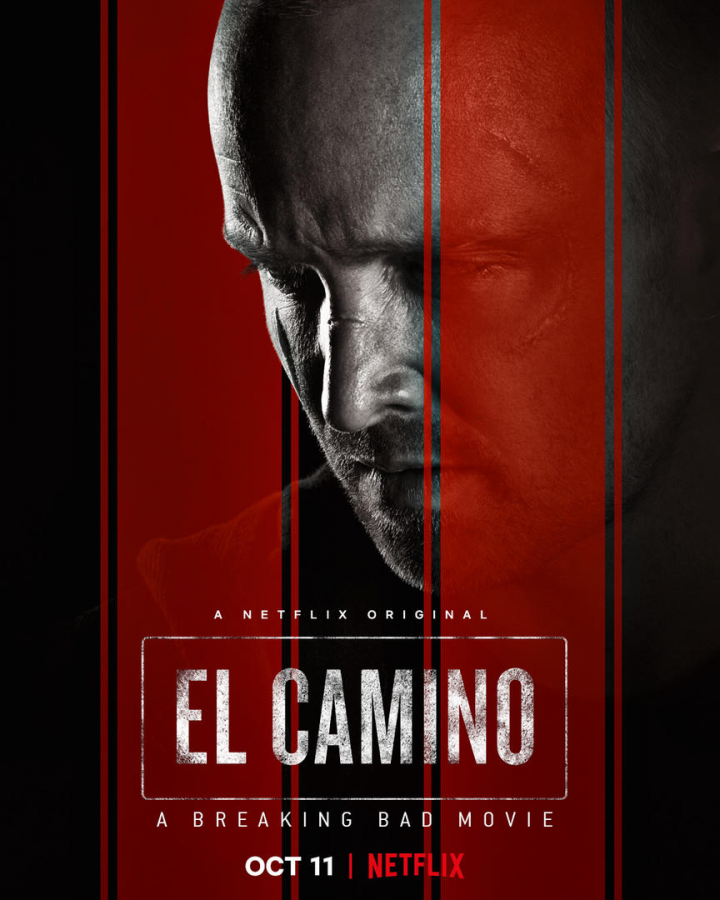Review: “El Camino” is a needless yet thrilling coda to the world of “Breaking Bad”
October 20, 2019
Writer’s Note: The following review has spoilers for the series “Breaking Bad”, so tread lightly.
“El Camino” is a superfluous yet electrifying epilogue to the groundbreaking story of “Breaking Bad,” providing definite closure to the turbulent tale of everyone’s favorite meth head.
Set in the aftermath of the phenomenal series finale, Jesse Pinkman, played by Aaron Paul, breaks free from his captors: a white supremacist gang that enslaved him into cooking crystal meth for them. The damaged yet determined former meth cook now has to gather enough money to get out of New Mexico and start a new life. In this endeavor, he has to evade law enforcement due to his connection with ex-partner and recently-deceased drug kingpin Walter White, played by Bryan Cranston, and deal with a pair of criminals who may have been connected to his horrible ordeal with the neo-Nazis.
The film is enriched with Jesse’s interactions with “Breaking Bad” characters past and present, from his tried-and-true buddies Skinny Pete, played by Charles Baker, and Badger, played by Matt Jones, to his conflicting mentors Mike, played by Jonathan Banks, and White himself. While they risk steering the film into pointless fan service territory, they sparingly offer a view into Jesse’s journey of redemption as he confronts his inner turmoil in order to move forward.
Paul returns to his iconic role as the headstrong yet tragic junkie burnout who prefers the colloquial term for a female dog. He now takes center stage in the film after five seasons of playing second fiddle to Cranston’s White/Heisenberg, one of the greatest TV antiheroes since Tony Soprano. Paul is phenomenal as the scarred and hardened persona of what was once a wannabe yet clever criminal. His raw and committed acting performance, which has won him three Emmys in the past, is one of the highlights of the film.
“El Camino” serves as “Breaking Bad” creator Vince Gilligan’s directorial-film debut after years of television work. He is belatedly an auteur in true form as his cinematic mastery of the series translates well into the movie. The wide cinematography utilizing the scenic landscape of New Mexico, the kinetic montages, and the snappy dialogue reminiscent of Tarantino’s best work all pervade through “El Camino” in spades. Moreover, the film strengthens the case for its parent show as a modern-day Western, with the classic “outlaw out of Dodge” storyline as well as an intense quick-draw gunfight in the final act.
With that being said, “El Camino” has its evident drawbacks. It feels more like an extended “Breaking Bad” episode than a feature length film, which is ironic given the show’s groundbreaking reputation as bringing cinematic scale to the small screen. Besides, the film is tailored for those who have watched “Breaking Bad” and remembered every aspect of it, which means that it glosses over for the objective viewer the unfortunate series of events that led to Jesse’s latest tale. Thankfully, the film’s marketing team has consistently provided recaps of the show online. Additionally, “El Camino” takes away the ambiguous, open-ended mystery surrounding Jesse’s triumphant escape in the series finale, defining his whereabouts for the viewer and making the finale a bit underwhelming.
But just because the case for having a sequel to a one-and-done story is moot does not necessarily mean that “El Camino” is underwhelming. It is a delight to see Jesse and experience the criminal underbelly of Albuquerque again. Everyone wants to see him finally get a definite clean break after suffering through a turbulent time spent with his manipulating mentor Heisenberg. As the film’s mantra asserts, it may not be possible to fix the past, but you can always make your own decisions moving forward. Whereas the “Breaking Bad” finale is Walter White’s exceptional swan song, “El Camino” is a strong send-off for Jesse Pinkman.










brock • Oct 23, 2019 at 2:54 am
overly wordy in a way that makes the essay feel as if it lacks substance, which may be a good metaphor for the film itself. overt usage of unnecessary maximilistic adjectives unfortunately make it feel like a high school essay, which i assume this probably is. overall it’s good, but not to the point. if a word doesn’t add to the writing, it generally shouldn’t be there.
Ericka • Oct 21, 2019 at 9:21 am
As a former journalist in my high school, Ver is quite advanced more than anyone I known in my high school (including my co-journalist) and I can say, this kid got skills. He connects well to his readers. The context is totally understandable, direct and precise. The words are not that hard to understand, it doesn’t get you to the point where you’d squint your eyes and say “uh, what does that mean?” Because back in my days as a sports journalist, most of us are into using fancy words for our articles to look better, but that doesn’t make a good article. This one is a good article. More of this!!!